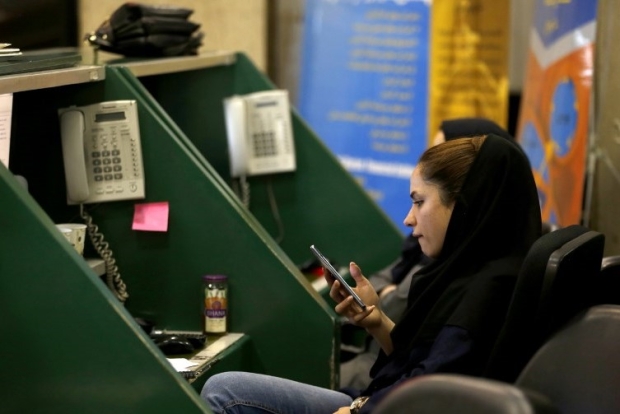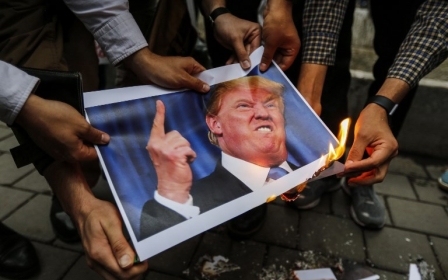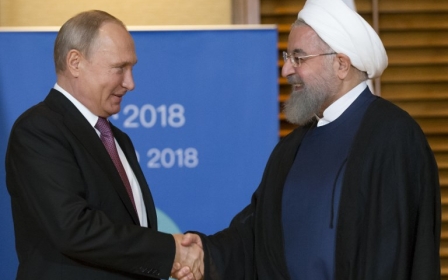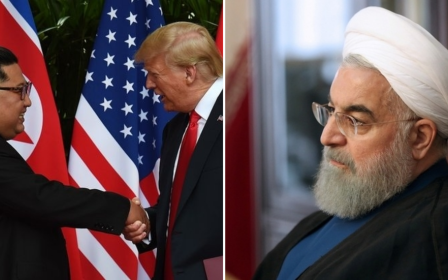If Russia is helping Trump's blockade of Iran, it better watch China
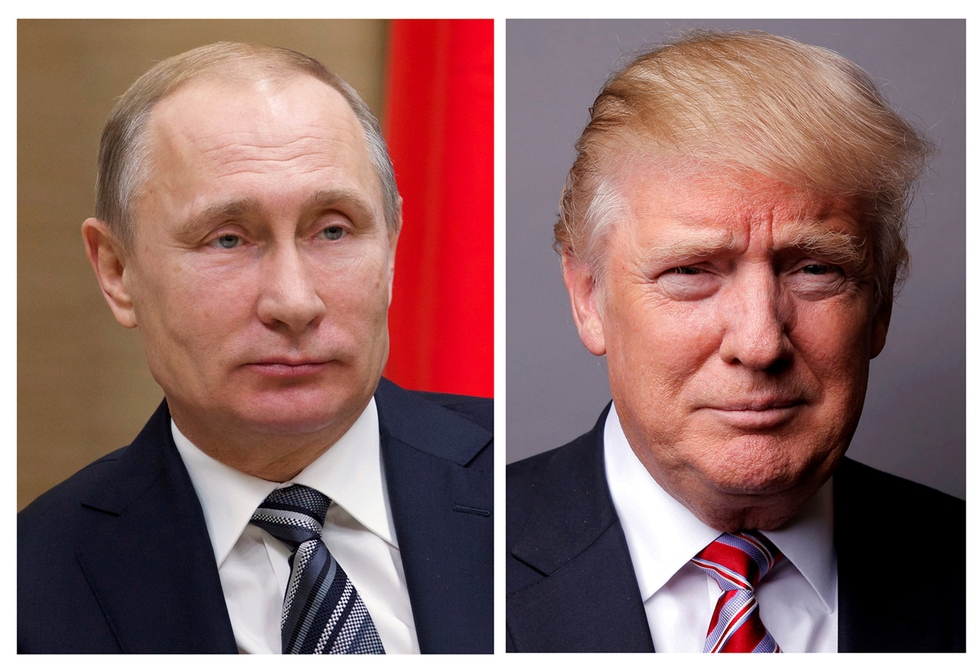
Since his earliest days on the campaign trail, it has been clear who Donald Trump and his team have had in their sights.
“Iran is the biggest destabilising force in the Middle East and its policies are contrary to our interests,” Defence Secretary James Mattis told his Senate confirmation hearing, having previously claimed that the country posed a bigger security threat than the Islamic State (IS) or al-Qaeda.
Vice President Mike Pence called Iran the “leading state sponsor of terrorism”, while National Security Adviser John Bolton has for years called for Iran to be bombed. President Donald Trump himself, in his own little remix of Pence’s phrase, has called Iran “the number one state of sponsored terror”, which presumably means something derogatory.
Rhetorical targets
China, of course, was famously accused of “raping our country” by Trump in 2016, while White House aide Peter Navarro claimed it was waging “economic aggression” against the US. Former Trump strategist Steve Bannon recently announced that “we are at war with China”.
Iran and China, then, have been favoured rhetorical targets since day one - but this year, that rhetoric morphed into all-out economic warfare. This month alone, Trump has unleashed tariffs on $60bn of Chinese goods, threatened to do so on $500bn, and announced his intention to cut Iranian oil exports to zero by November.
These weapons of financial destruction are openly aimed at crippling and sabotaging China and Iran, to stymie their development and bring them to their knees. Yet at the same time, the leader of Iran and China’s major geopolitical ally, Russian President Vladimir Putin, is being courted and flattered by Trump. What is going on?
This deal lay behind Trump’s brazen claim that world oil supplies would plug the gap created by the loss of Iranian crude; without the end to Russian-Saudi production limits, this would have been unthinkable
These hostile acts against two of Russia’s key allies have, as one might expect, been condemned by Putin’s government. Prior to Trump’s May announcement that he would violate the Iran nuclear deal by restoring sanctions, the Kremlin warned of “harmful consequences” should he do so.
And following the recent Helsinki summit between the two leaders, Putin continued to back the deal - albeit on the grounds of limiting Iranian sovereignty rather than defending it. He noted that the deal had turned Iran into one of the International Atomic Energy Agency's most heavily monitored countries. Russia similarly denounced the tariffs slapped on China earlier this month.
Yet, behind the rhetorical opposition, Russian actions appear to be facilitating Trump’s aggression. After 18 months of oil production cuts agreed by Russia and Saudi Arabia in 2016, which successfully raised oil prices out of the slump into which they had fallen, Russia last month proposed an unexpected and immediate reversal of this policy.
The low prices that had plagued oil markets before the 2016 cuts had caused huge problems for producer countries such as Russia, Iran and Venezuela, leading many to believe that the Saudis had been ordered by the US to flood the market to sabotage the economies of its geopolitical foes.
Zero oil exports
The new production quotas had given these countries some much-needed breathing space; yet, in June, Russia put forward a proposal to OPEC to increase production by 1.8 million barrels per day (bpd) - and, unusually, proposed that these increases were to start kicking in within weeks. In the end, a pact to increase production by one million bpd - spearheaded by Russia and Saudi Arabia - was agreed by OPEC and non-OPEC countries.
The rise was opposed by Iran, Iraq, Venezuela and Algeria, with Iranian Oil Minister Bijan Zanganeh saying ahead of the meeting: “OPEC is not the organisation to receive instruction from President Trump ... OPEC is not part of the Department of Energy of the United States.”
Within days of the adoption of the Russian-led production increase, the Trump administration announced its plans to reduce Iranian oil exports to zero by November. Questioned on whether such a policy may cause disruption as countries scrambled to replace supplies, State Department policy director Brian Hook said: “We are confident there is sufficient global spare oil capacity.”
While the Russian-Saudi deal offers alternative sources of supply, the trade war now underway demonstrates Trump’s willingness to use tariffs against those who do not bend to his geopolitical will.
While Trump has openly threatened sanctions against those who do not heed his call to end their dealings with Iran, it is quite possible that those who do heed it will be rewarded with tariff exemptions. China - Iran’s biggest trading partner, now threatened with tariffs on all $500bn of its exports to the US - will be particularly under pressure.
If Trump does indeed make tariff-free access to the US market conditional on cutting investment and trade with Iran, China would face a major dilemma
On the surface, then, Russia’s actions appear self-defeating. The end to the hugely successful production quotas immediately triggered a drop in oil prices - Russia’s main export commodity – while facilitating the escalation of US economic warfare against key Russian ally Iran. Yet, there are several reasons why Russia might be supporting Trump’s moves.
Most obviously, Iran is a major competitor with Russia for oil export markets - especially in Europe. European hopes to reduce dependence on Russian energy supplies are likely to be seriously dashed if they can no longer turn to Iran as an alternative supplier. Quite simply, Russia will sell more oil without Iranian competition.
More than this, however, even Trump’s use of tariffs as leverage to push countries away from Iran could be to Russia’s benefit. If Trump does indeed make tariff-free access to the US market conditional on cutting investment and trade with Iran, China would face a major dilemma.
China and Iran
For years, China has been not only Iran’s major trading partner, but also its investment financier. In 2011, China signed a $20bn agreement to boost bilateral cooperation in Iran’s industrial and mining sectors. Today, China is poised to take over development of the massive South Pars oil and gas field should the French company Total pull out, as it is widely expected to do - and a $3bn deal was recently signed, giving Chinese state oil firm SINOPEC the right to expand the Abadan oil refinery in Iran's Khuzestan Province.
Meanwhile, Fox News reports: "With the US Treasury putting pressure on western banks to not make any deals with Iran, the Chinese state-owned CITIC bank is extending lines of credit worth $10bn for Iranian banks. This funding will finance water, energy and transport projects. To bypass US sanctions, the lines of credit will use euros and yuan currencies.”
Most significant for Russia is the $1.5bn deal made in 2017 by the Chinese Export-Import Bank to finance a high-speed railway between Tehran and Mashhad. The railway is envisioned to become part of China’s Belt and Road Initiative (BRI), creating a high-speed transit route between central Asia and Europe that will shave weeks off current travel times.
This May - in a clear act of defiance against the US - China opened a new train line between China’s Inner Mongolia Autonomous Region and Tehran, shortening travel time by 20 days compared to cargo ship. Once the full vision of a Chinese-built, high-tech, high-speed rail network across central Asia is realised, however, the current “northern route” through Russia is likely to be rendered all but redundant.
Could it be, then, that Russia sees it as in its own interests to facilitate Trump’s quest to chase Chinese investment out of Iran, in order to preserve its trade routes and access to European oil markets?
'A common resentment'
If so, it is likely to be disappointed - for Iran is central not only to the Belt and Road Initiative, but also to China's defence strategy.
As correctly observed in a recent piece in The Diplomat, “Iran constitutes [China’s] true priority. China has nurtured bilateral relations with Tehran for decades, leveraging a common resentment toward Western dominance. This partnership has great geostrategic importance to both nations. Thanks to its oil and gas reserves, Iran could help Beijing withstand a US attack on its SLOCs (Sea Lines of Communication).”
For China, much as it naturally seeks to avoid further punishment from the US, Iran is simply too important to be bargained away. Unfortunately not so, it seems, for Moscow.
- Dan Glazebrook is a political writer and editor of stopstarvingyemen.org. He is author of Divide and Ruin: The West's Imperial Strategy in an Age of Crisis and blogs at danglazebrook.com.
The views expressed in this article belong to the author and do not necessarily reflect the editorial policy of Middle East Eye.
Photo: Russian President Vladimir Putin (L) and US President Donald Trump (R) (Reuters)
Middle East Eye propose une couverture et une analyse indépendantes et incomparables du Moyen-Orient, de l’Afrique du Nord et d’autres régions du monde. Pour en savoir plus sur la reprise de ce contenu et les frais qui s’appliquent, veuillez remplir ce formulaire [en anglais]. Pour en savoir plus sur MEE, cliquez ici [en anglais].



